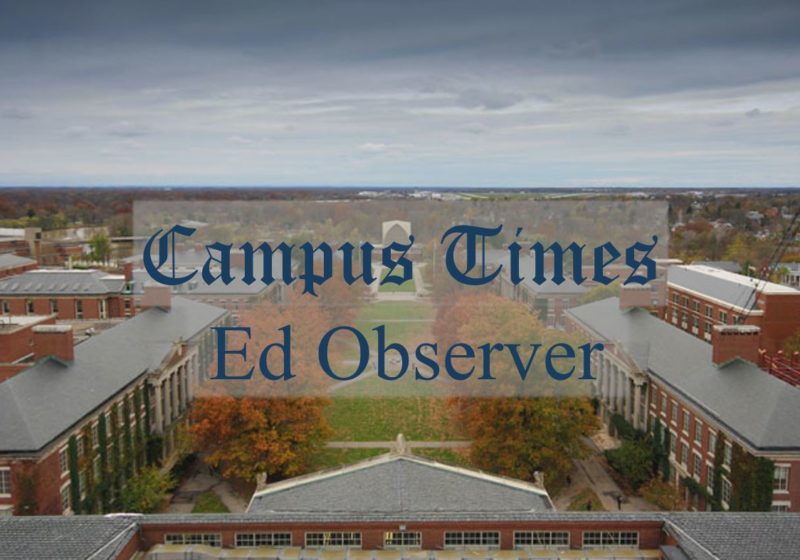I became the Publisher of the Campus Times in the same semester COVID-19 first reared its ugly head, and I’m leaving the position in about two weeks. My time as Publisher has mostly been defined by the pandemic, so I’ve had pretty terrible luck.
For those of you who don’t follow CT regularly — which is probably the overwhelming majority of you — the Publisher traditionally writes the last Editorial Observer (an opinion piece written by a member of the editorial staff).
So, I thought I’d use this chance to thank the people who have helped the CT this year: the volunteers who delivered our Halloween issue to dorms and other spaces for free, everyone who sat down for interviews and responded to inquiries, our advisor Anne-Marie for helping our print edition get approved and so much else, and, of course, all of our staff and contributors for putting in the work so that the paper could happen every week.
Without them, the CT would have stopped, and I would have lost one of my favorite college experiences for a year, like many others have in less fortunate organizations.
But hey, why does it matter if a college publication goes on hiatus, right? Why didn’t we just take a break? Does the public really need our hot takes like “goddamn yellowjackets everywhere?”
I’d argue yes, but more seriously, thousands of newspapers nationwide have closed or merged in the last two decades, and local journalism is in crisis. Sometimes, that leaves college publications as the only source of news in their areas.
Thankfully, Rochester’s local newspapers are hanging on, but that doesn’t change the fact that college journalism is necessary.
As a recent New York Times story stated, student reporters are on the frontlines in covering COVID-19 on college campuses, when sometimes other publications don’t have the bandwidth to cover it all.
We’re the ones with the front row seat to online classes, outbreaks in dorms, and testing difficulties. Administration isn’t going to publish their own dirty laundry through University Communications, and local newspapers have bigger fish to fry.
The CT got the scoop when classes moved online in March. And when changes to meal plans and housing policies were made from March to November.
It’s not just COVID-19 reporting, either; 2020 is not that kind of year.
We reported on the controversy over discriminatory recruitment in Greek life and the calls for mass disaffiliation. Our news reporters, photographers, and videographers have been tirelessly covering the Black Lives Matter movement both on campus and off throughout the semester. We investigated UR’s budget cuts and their impact on faculty and departments.
But we aren’t, and haven’t been, perfect. We’ve issued our fair share of corrections, we’ve had trouble adjusting to reporting on Zoom events, and we’ve missed many stories that should have been told, news that should have been covered. We’re students first.
It happened even when our staff wasn’t scattered across the world, living through a pandemic.
Because, let’s face it, we don’t get paid enough to spend 10-20 hours a week writing pieces, taking photos, drawing illustrations, and getting last-minute interviews. Actually, we don’t get paid at all.
We’re tasked with keeping the people in power at our University accountable, but you, our readers (the few that there are), have to keep us accountable, too.
This is a two-way street. Write letters to the editor when we publish questionable opinions. Send us a strongly worded email when you see that we haven’t been covering a major piece of news, or that we’ve been covering it wrong. Better yet, reach out and work with us to cover important content. And we can’t make corrections unless someone calls out our errors.
Finally, send us news tips, especially about how this unprecedented year has affected you and your friends.
Because if we don’t cover it, who will?
News tips can be sent to editor@campustimes.org.



